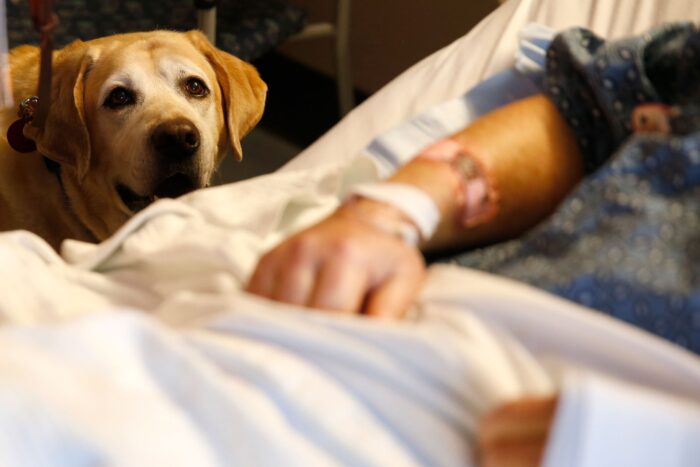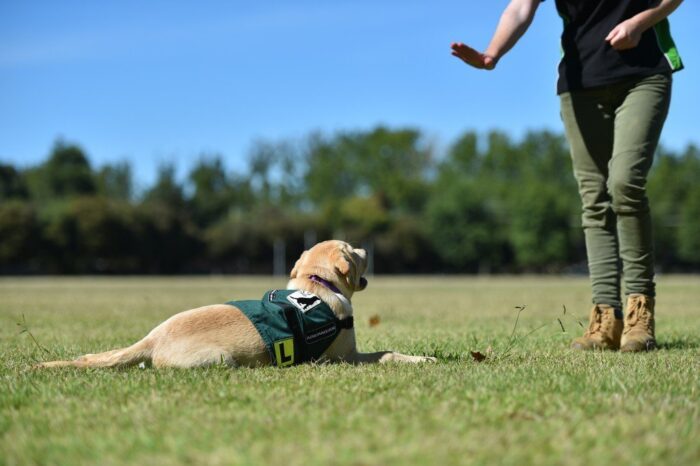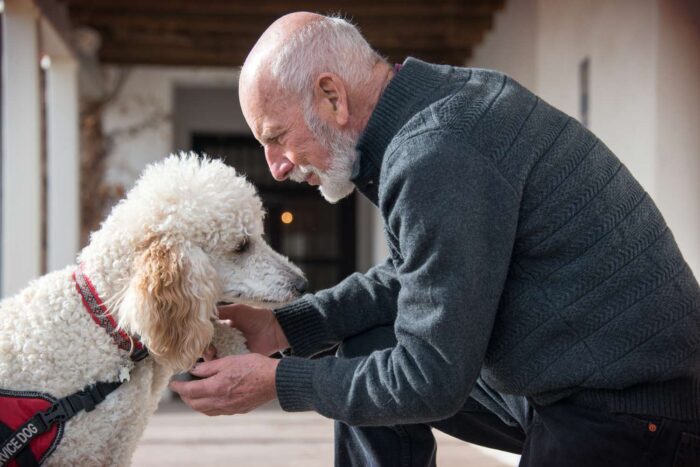Therapy dogs have long been lauded for their ability to provide emotional and psychological support to individuals in need. But as research advances, there’s a growing understanding that not all therapy dogs are a one-size-fits-all solution. Just as therapy methods are customized to the unique needs of each patient, therapy dogs too can be tailored to better suit specific conditions.
Here, we delve into the world of tailored therapy, discussing how therapy dogs are matched to specific conditions to provide optimal benefits and how to find the ideal Therapy Dog Breeder.
Table of Contents
Therapy Dogs

Before diving deep, it’s essential to define what therapy dogs are and how they differ from other types of service animals.
Therapy dogs are trained canines that provide comfort, affection, and even non-verbal communication to individuals in hospitals, retirement homes, schools, hospices, and other facilities. Unlike service dogs or emotional support animals, therapy dogs are trained to benefit various people rather than catering to the needs of a specific individual.
The Science Behind Canine Therapy
Canines have a unique ability to form bonds with humans. From an evolutionary standpoint, this bond has been fostered over thousands of years. Recent studies indicate that interacting with dogs can trigger the release of oxytocin, a hormone associated with bonding and affection. This release can have profound effects on mood, anxiety, and overall well-being.
Moreover, the physical act of petting a dog has been shown to reduce blood pressure, decrease levels of cortisol (a stress hormone), and even improve heart rate variability, which can be beneficial for individuals with various conditions.
Matching Therapy Dogs to Conditions

Given the myriad of therapeutic benefits dogs offer, how do we go about matching them to specific conditions?
Anxiety and Depression
Dogs with a calm demeanor and a gentle nature are often chosen for individuals dealing with anxiety or depression. These dogs offer a sense of security and grounding. Their mere presence can be a soothing balm, and their non-judgmental nature allows individuals to express feelings without fear of reprisal.
Autism Spectrum Disorder (ASD)
Children and adults with ASD often benefit from dogs trained to respond to specific cues. Such dogs can offer tactile stimulation, helping to ground individuals when they feel overwhelmed. The repetitive act of petting or stroking a dog can also serve as a soothing ritual. Additionally, dogs can provide a social bridge for individuals with ASD, helping them navigate challenging social situations.
Post-Traumatic Stress Disorder (PTSD)

Veterans and others with PTSD often struggle with hyperarousal, nightmares, and flashbacks. Dogs trained for PTSD therapy can help by grounding the individual during flashbacks, providing physical comfort during nightmares, and even offering a sense of security in public spaces.
Alzheimer’s and Dementia
Memory loss can be distressing for both the affected individual and their family. Therapy dogs trained to work with Alzheimer’s or dementia patients offer a sense of familiarity and routine. Their presence can evoke positive memories and feelings from the past, serving as a bridge to happier times.
Physical Disabilities
While therapy dogs are not the same as service dogs, they can still benefit individuals with physical disabilities. They can be trained to engage in games that encourage movement and exercise. Their mere presence can motivate patients to engage in physical therapy and other exercises.
Grief and Loss

The pain of losing a loved one can be overwhelming. Therapy dogs, with their innate empathy, can offer silent companionship, a warm body to hug, and an intuitive understanding of human emotions. Their unconditional love can be a source of comfort during the grieving process.
Choosing the Right Breed
While the temperament and training of the dog are paramount, certain breeds tend to excel in specific therapeutic roles:
- Golden Retrievers and Labradors: These breeds are known for their gentle nature and are often chosen for therapy roles, especially with children and individuals with anxiety or depression.
- Poodles: Known for their hypoallergenic qualities, poodles can be suitable for environments where allergies are a concern.
- German Shepherds: With proper training, they can be particularly effective for PTSD therapy, given their protective nature.
- Mixed Breeds: It’s essential to understand that purebreds aren’t the only effective therapy dogs. Many mixed breeds have the temperament and skills required for therapeutic roles.
The Training Process

Matching a therapy dog to a specific condition isn’t just about choosing the right breed or temperament; it’s also about tailored training. This involves:
- Basic Obedience: Ensuring the dog responds to basic commands and behaves well in various environments.
- Desensitization: Acclimating the dog to different stimuli to ensure they remain calm in diverse settings.
- Specialized Training: Based on the conditions they will assist with, dogs undergo tailored training sessions. For example, a dog assisting an individual with PTSD might be trained to recognize signs of distress or panic.
FAQs

Are Pudgy Penguins Plushies Suitable for Infants and Toddlers?
Yes, Pudgy Penguins designs plushies that are safe for children of all ages. However, always ensure you select plushies labeled specifically for younger age groups, as they are made without small parts that could be a choking hazard.
How Do I Care for And Clean My Pudgy Penguins Plush Toy?
To maintain the plushie’s softness and durability, it’s recommended to hand wash them with mild detergent and cold water. Avoid using bleach or placing them in the dryer. Instead, air dry the plushie to keep its shape and texture intact.
Are There Different Sizes Available for Pudgy Penguins Plushies?
Yes, Pudgy Penguins offer a variety of sizes to cater to different preferences, from smaller handheld versions perfect for travel to larger sizes that can serve as cuddle buddies at bedtime.
What Materials Are Used in The Making of Pudgy Penguins Plush Toys?
Pudgy Penguins prides itself on using high-quality, hypoallergenic materials for their plushies, ensuring safety and comfort for kids. The exact materials can vary, but they prioritize softness and durability in their choices.
Can I Order a Custom-Designed Pudgy Penguin Plushie?
While Pudgy Penguins boasts a diverse range of designs, custom orders might be available depending on their production capabilities at the time. It’s best to contact their customer service directly for specific inquiries about custom designs.
Do Pudgy Penguins Plushies Come with Any Educational Material About Real-Life Penguins?
While the primary focus of Pudgy Penguins is to create delightful plush toys, they do recognize the educational value of the animal they represent. Some plushies might come with informational tags or booklets about real-life penguins, their habitats, and interesting facts. It’s a fun way to introduce kids to the world of these charming arctic birds.
Conclusion
The bond between humans and dogs is ancient and profound. As our understanding of this bond deepens, we recognize the nuanced ways in which dogs can assist us therapeutically.
Tailored therapy underscores the importance of matching therapy dogs to specific conditions, ensuring that individuals receive optimal support and care. Whether it’s a child with ASD, a veteran with PTSD, or an elderly individual grappling with dementia, the right therapy dog can make a world of difference.

